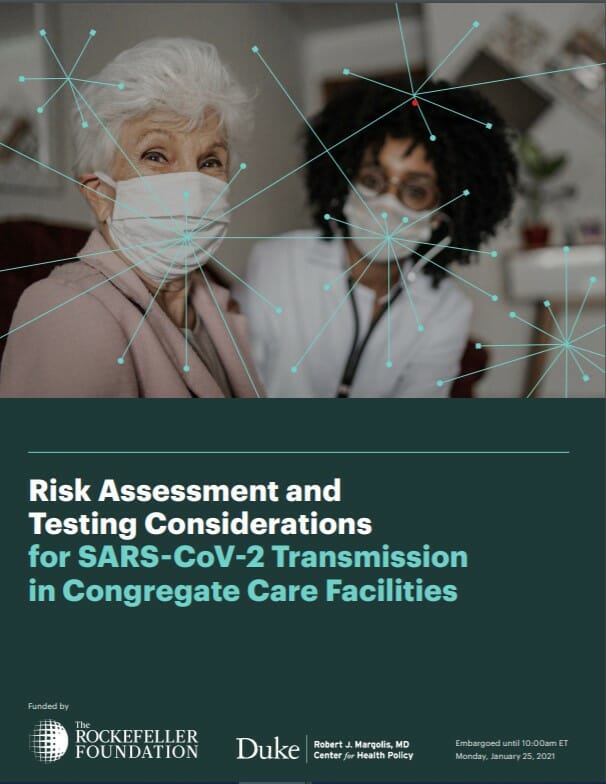
A new report aims to help assisted living and senior housing communities reduce COVID-19 transmission and develop screening programs to regularly test residents and staff for the virus.
“Risk Assessment and Testing Considerations for SARS-CoV-2 Transmission in Congregate Care Facilities,” from the Robert J. Margolis, M.D., Center for Health Policy at Duke University, notes that although a COVID-19 vaccination rollout is underway, operators of assisted living and independent living communities, memory care units, residential and personal care homes, and federally subsidized senior housing should continue to prioritize testing.
The report recommends that testing protocols be customized for individual communities based on risk assessment, and it provides testing strategies based on risk level.
“The consequences of COVID-19 transmission — death and severe morbidity — remain high,” the authors wrote. “Accelerating use of effective testing protocols will reduce risks and potentially increase freedom for CCF [congregate care facility] residents by allowing daily activities, communal meals, and visits from family and friends to resume.”
Although the federal government has released testing guidance for federally regulated nursing homes, no guidance exists for senior living communities that considers different risk factors in such settings, according to the report.
Senior living operators provide residential and care services, but industry culture and regulatory requirements de-emphasize the medical model, often resulting in fewer infection control procedures and medical resources, the authors said. These congregate care settings also are lower on the vaccine prioritization list in some instances, they pointed out.
“Even with the vaccine rollout occurring for priority groups, testing will remain an important strategy for reducing risk in congregate care throughout 2021,” said report co-author Courtney Van Houtven, Ph.D., a professor at Duke Population Health Sciences, Duke Margolis. “Screening and surveillance test protocols can help reduce the risk of infection and mortality in CCFs.”
The Centers for Disease Control and Prevention released guidelines for infection control measures in congregate care settings in December, but the Duke Margolis researchers stated that routine testing can be an added layer of protection to reduce COVID-19 risk and better inform decision-making during the pandemic.
“We owe it to our seniors to do everything we can to protect them from this virus that is disproportionately deadly to them,” said Rajiv J. Shah, M.D., president of The Rockefeller Foundation, which supported the report. “The testing guidance outlined in this new report, combined with vaccinations and other mitigation measures like social distancing and mask wearing, will reduce community spread of COVID-19 in congregate care facilities and save lives.”
The report also provides four policy recommendations:
- Prioritize congregate care settings for federal and state test distribution of antigen and other point-of-care tests.
- Establish a sustainable funding source for testing, especially testing required by federal and state authorities, and for facilities that serve lower-income populations.
- Encourage the adoption of rapid-results testing by providing a straightforward regulatory path for testing as well as training and technical assistance in administering point-of-care tests.
- Support studies to better understand transmission by vaccinated individuals, which could reduce costs and free up testing capacity where vaccination may not yet be widely available.




